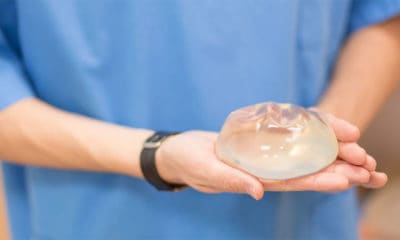There are a lot of women out there who feel that their breast implants are making them sick. The symptoms can vary, but most complain of constant fatigue and “brain fog.” Many have gone to see their primary care physician, had a physical exam and blood work, and been told that nothing is wrong. By the time that they come in to see board certified plastic surgeon Dr. Tracy Pfeifer in her New York office, they are stressed beyond belief. While many plastic surgeons dismiss breast implant related illness as a hoax, Dr. Pfeifer believes that every patient needs to be heard, and treated. Below, she walks us through her approach to dealing with breast implant related illness.
What is Breast Implant Related Illness?
Breast implant related illness is a catch all term for a group of symptoms that some women feel are caused by their saline or silicone gel breast implants. These symptoms include:
- fatigue
- brain fog or memory loss
- headaches
- joint & muscle pain
- hair loss
- recurring infections
- skin rash
- IBS
- swollen lymph nodes & glands
- thyroid problems
- adrenal disfunction
It’s a pretty wide spread group of symptoms. In general, most of these patients have seen their internist were they’ve had a physical, including blood work, and there is no real medical explanation for their symptoms. They are frustrated and scared, and rightly so.
Caring for Patients with Breast Implant Related Illness
It’s human nature for the patient to feel that “maybe my implants are making me sick,” explains Dr. Pfeifer. They go on the internet and google “my implants are making me sick.” Numerous websites come up reinforcing the idea that this is true. But is it? When Dr. Pfeifer sees a patient who thinks her implants may be making her sick for a consultation, she likes to speak with them about what “we know from a scientific standpoint and what I can do to care for them as a doctor taking care of my patients.”
From a scientific standpoint, there is “no data to show that either a saline or silicone implant makes the patient sick,” explains Dr. Pfeifer. Breast implants are the most studied medical device in the world. They have been extensively tested, studied, and researched for decades. Does this mean that there aren’t a few patients who, quite simply, can’t tolerate their implants? “It’s possible,” shares Dr. Pfeifer. “We just don’t know the answer to that question.”
What plastic surgeons do know is that if they look at the lab work of these women who claim to have breast implant related illness, their lab work comes back completely normal. There are a few patients who have abnormal lab work, but these results are typically consistent with some type of autoimmune disease. In fact, in the patients with abnormal results, when you take out the implants, their labs remain abnormal. Clearly then, they had some underlying condition that was not related to their breast implants.
Breast Implant Related Illness Treatment Plan
In general, by the time a breast implant related illness patients comes in to Dr. Pfeifer’s office, she is stressed out. She has typically already seen another plastic surgeon about removing her implants and been dismissed. Many see no reason to remove perfectly good implants, especially ones that are making you look good.
In Dr. Pfeifer’s experience, most of these patients do agree that they look good, but they still feel that their implants are making them sick and they want them removed. Her approach is to perform a full physical exam. She sends the patent to a rheumatologist for blood work in order to make certain that there’s no undiagnosed, underlying issue that can be treated. She also makes it very clear to the patient that, in all likelihood, removing the implant will not address her symptoms. And then, she removes the implant.
Managing Expectations
Dr. Pfeifer is careful to explain to the patient what to expect after the removal of their implants. There may be some rippling and undulations in the overlying breast tissue, as well as some tethering or retraction of the skin. This has not been her personal experience, but it can happen. Furthermore, if the patient has a tight skin envelope, and they have an incision in the inframammary fold or crease beneath the breast, that incision might be a little bit lower than their old fold. This means that once the implant is removed, their scar may become visible, and look as if it’s resting on the upper portion of the abdomen.
As long as the patient is ok with what can happen, Dr. Pfeifer thinks it’s fine to remove her implants. Sometimes patients do feel better after their implants are removed. It’s hard to say if it’s due to a physical improvement, but there is a definite benefit from the emotional relief of not having to worry anymore. For Dr. Pfeifer, “I just want patients to be happy and comfortable in their bodies.”


















Facebook
Twitter
Instagram
YouTube
RSS